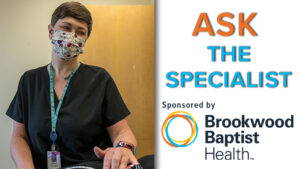Princeton Baptist Medical Center is celebrating 100 years since it first opened its doors as Birmingham Baptist Hospital. The hospital has been delivering babies since 1922 and has developed a reputation of being a great place to have a baby. At Princeton Baptist, there are several Ob/Gyns and nurse midwives to assist mothers on their pregnancy journey. Here are some common questions people ask about midwives.
What is a midwife?
Midwives are professionals who are trained to assist women and families to achieve healthy pregnancies, safe births and optimal recoveries postpartum. Midwives are experts in normal pregnancy and birth, and for nurse-midwives, they specialize in holistic GYN care. There are several different certifications for midwives. There are Certified Professional Midwives (CPMs) who are experts in out-of-hospital births and are certified nationally through Midwife Alliance of North America (MANA). The education level of CPMs can vary from apprenticeship training to a graduate degree in midwifery. There are also Certified Nurse Midwives (CNMs) who begin their training as Registered Nurses (R.N.) and then obtain a graduate degree in midwifery, usually through a university school of nursing. CNMs are often regulated by states in the same way other advanced practice nurses are. The midwives that attend births at Princeton are Certified Nurse Midwives and work alongside Ob/Gyn physicians.
What is different about the midwifery model of care?
The midwifery model of care means partnering with expecting mothers and their families to provide expert personalized care in a way that respects them and their family as primary decision makers. Additionally, it honors the normalcy of life events-like pregnancy, childbirth, breast feeding, and even menopause. If a complication arises in pregnancy or birth, midwives are the first line and are trained to respond to emergencies and can consult, collaborate, or transfer care to physicians as needed. The midwives of Princeton offer an alternate version of prenatal care, called “Supportive Pregnancy Care” which is a model in which you get your prenatal care in a group setting. Group care is the only evidenced based approach that has been shown to reduce the risk of preterm birth, and low birth weight babies. It is also the only approach that has been shown to decrease racial disparities in childbirth. Bonus thing about group care is that it is super fun!
Can you have an epidural if you chose to have a midwife?
Certified Nurse Midwives can still care for women who plan to have an epidural or choose to get one during labor. The anesthesiologist or nurse-anesthetist administers the epidural, and the nurse-midwife will continue to care for the mom and baby during labor and birth. Many midwives will still encourage frequent position changes and may even encourage a side-lying position for the birth after an epidural. Some women can even still get on their hands and knees for the birth. Epidurals can be the first step down a cascade of interventions including artificially breaking the bag of waters, IV Pitocin infusions, and so on. We strive to continue to preserve as much of the normal process of birth as possible, and make every attempt to avoid the use of interventions unless they are medically indicated.
Can you see a midwife even when you are not pregnant?
Many people are aware that midwives provide pregnancy and birth related care but many are not aware that CNMs also provide gynecological care. They can prescribe all types of birth control, help with painful or heavy periods, do STI screening, order lab work, do pap smears, and order mammograms. A GYN annual visit with a midwife is usually more comprehensive in talking about diet and lifestyle, emotional well-being, in addition to female related issues. We also strive to be trauma informed, meaning we rarely use stirrups for exams, use code words, offer self-collection of swabs, and if it makes you more comfortable, you can request to insert the speculum yourself.
Can I have a midwife if my pregnancy is “high-risk”?
If you are interested in the midwifery model but worried that you are too high-risk, you might be surprised to find out that a CNM may be able to offer some or all of your care. CNMs work closely with Ob/Gyn doctors and even in some cases high-risk specialists called Maternal Fetal Medicine doctors. This power combination may offer the best outcomes for some families. Midwifery works best when it is fully integrated in a system that offers consultation and collaboration like this.
While there is so much more to learn about midwives, this is just a start. To learn more about services at Princeton Baptist Medical Center, visit www.princetonbaptistmedicalcenter.com .
Sheila Lopez is a Certified Nurse Midwife who practices at Princeton Baptist Medical Center.





